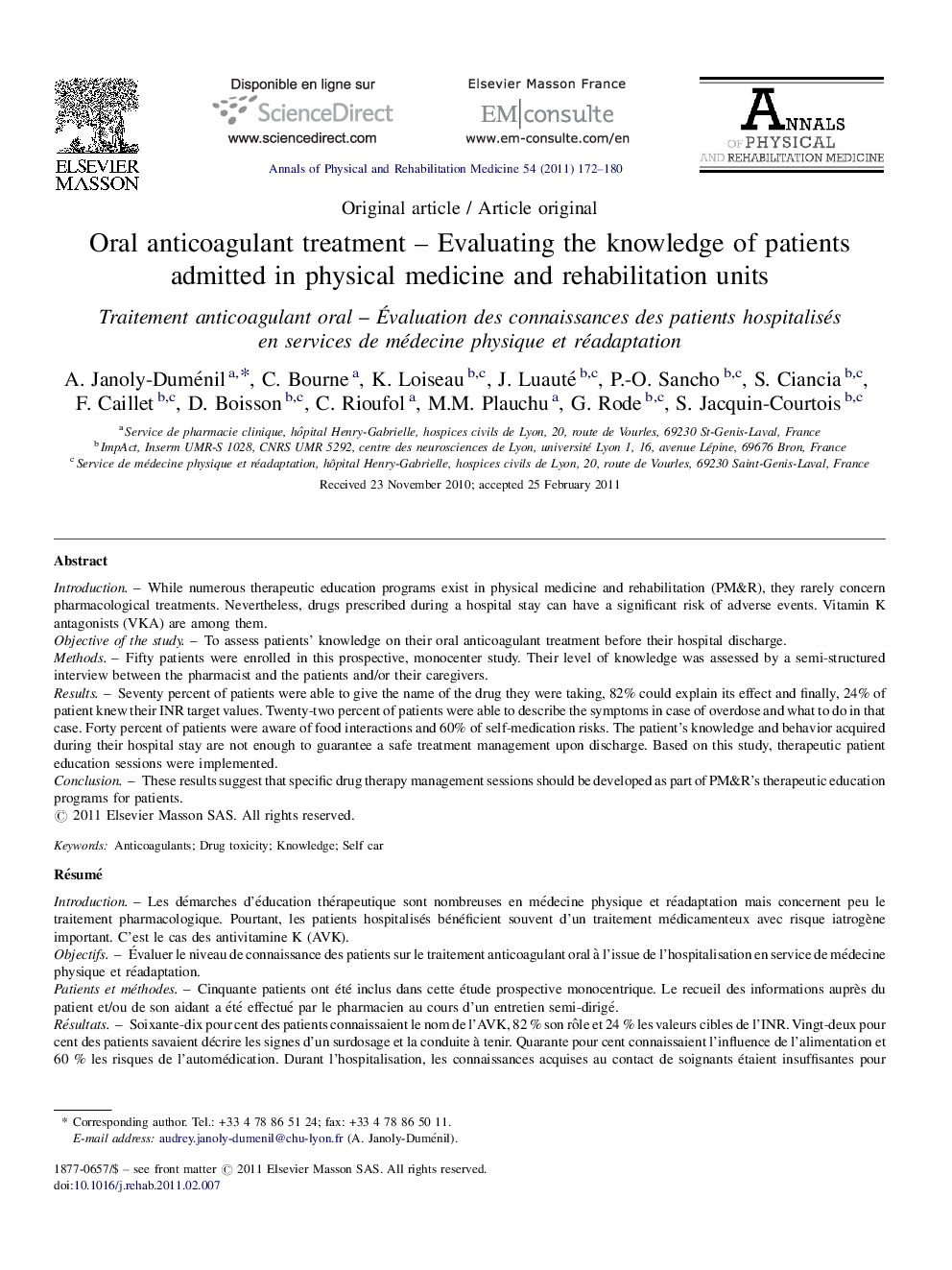| کد مقاله | کد نشریه | سال انتشار | مقاله انگلیسی | نسخه تمام متن |
|---|---|---|---|---|
| 4041311 | 1603338 | 2011 | 9 صفحه PDF | دانلود رایگان |

IntroductionWhile numerous therapeutic education programs exist in physical medicine and rehabilitation (PM&R), they rarely concern pharmacological treatments. Nevertheless, drugs prescribed during a hospital stay can have a significant risk of adverse events. Vitamin K antagonists (VKA) are among them.Objective of the studyTo assess patients’ knowledge on their oral anticoagulant treatment before their hospital discharge.MethodsFifty patients were enrolled in this prospective, monocenter study. Their level of knowledge was assessed by a semi-structured interview between the pharmacist and the patients and/or their caregivers.ResultsSeventy percent of patients were able to give the name of the drug they were taking, 82% could explain its effect and finally, 24% of patient knew their INR target values. Twenty-two percent of patients were able to describe the symptoms in case of overdose and what to do in that case. Forty percent of patients were aware of food interactions and 60% of self-medication risks. The patient's knowledge and behavior acquired during their hospital stay are not enough to guarantee a safe treatment management upon discharge. Based on this study, therapeutic patient education sessions were implemented.ConclusionThese results suggest that specific drug therapy management sessions should be developed as part of PM&R's therapeutic education programs for patients.
RésuméIntroductionLes démarches d’éducation thérapeutique sont nombreuses en médecine physique et réadaptation mais concernent peu le traitement pharmacologique. Pourtant, les patients hospitalisés bénéficient souvent d’un traitement médicamenteux avec risque iatrogène important. C’est le cas des antivitamine K (AVK).ObjectifsÉvaluer le niveau de connaissance des patients sur le traitement anticoagulant oral à l’issue de l’hospitalisation en service de médecine physique et réadaptation.Patients et méthodesCinquante patients ont été inclus dans cette étude prospective monocentrique. Le recueil des informations auprès du patient et/ou de son aidant a été effectué par le pharmacien au cours d’un entretien semi-dirigé.RésultatsSoixante-dix pour cent des patients connaissaient le nom de l’AVK, 82 % son rôle et 24 % les valeurs cibles de l’INR. Vingt-deux pour cent des patients savaient décrire les signes d’un surdosage et la conduite à tenir. Quarante pour cent connaissaient l’influence de l’alimentation et 60 % les risques de l’automédication. Durant l’hospitalisation, les connaissances acquises au contact de soignants étaient insuffisantes pour contribuer à une sécurité d’utilisation des AVK lors du retour au domicile. À l’issue de ce travail, des séances d’éducation thérapeutique ont été mises en place.ConclusionCes résultats suggèrent l’intérêt d’intégrer des séances relatives aux traitements médicamenteux aux programmes éducatifs de médecine physique et réadaptation.
Journal: Annals of Physical and Rehabilitation Medicine - Volume 54, Issue 3, May 2011, Pages 172–180